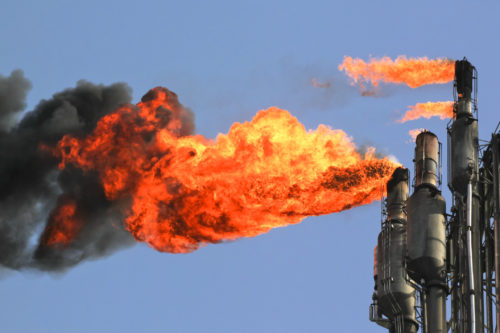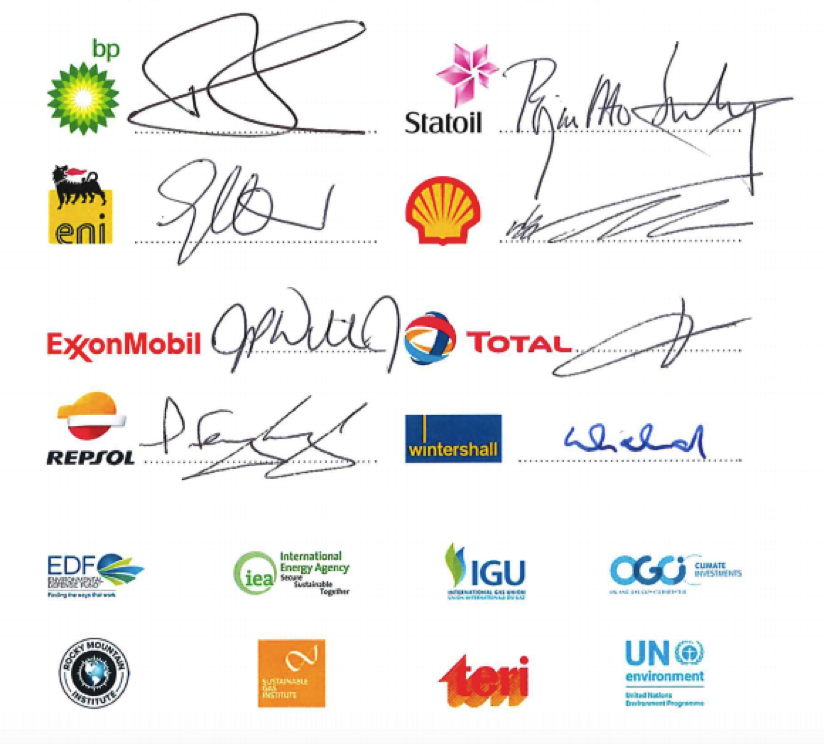
Oil and Gas Companies Pledge Major GHG Emissions Reductions—Will They Follow Through?
High levels of methane emissions from the oil and gas industry are responsible for one of the most urgent climate problems we face today. Methane, a byproduct of oil and gas production, is a potent greenhouse gas. Methane is 85 times more potent than CO2 when measured over 20 years and 25 times more potent when measured over 100 years. Alarmingly, methane emissions worldwide are growing at 25 million tons per year, and a recent NASA study points to the fossil fuel industry as producing nearly 70 percent of all new emissions.
In a carbon-constrained world, the wasteful dumping of methane into the atmosphere is an intrinsic threat to the oil and gas industry, as well as to the broader efforts to limit global warming to two degrees. That is why in late 2017, a group of eight international oil and gas companies—BP, Eni, ExxonMobil, Repsol, Shell, Statoil, Total, and Wintershall—signed on to a set of guiding principles aimed at reducing methane emissions from the oil and gas industry. More recently, Russia’s Gazprom and Qatar Petroleum also signed on to the commitment.
Ensuring that oil and gas producers understand the impacts of methane on the climate and sign on to commitments to help limit their contributions to the methane problem are important first steps. Matching commitments with corresponding action is even more important, however, and for short-term climate pollutants like methane, quick and decisive action may make all the difference in keeping within the two-degree climate threshold.
Guiding Principles for a Climate-Conscious Oil & Gas Industry
The Guiding Principles were developed in collaboration with the Environmental Defense Fund, Rocky Mountain Institute, Columbia University, the International Energy Agency, the International Gas Union, the Oil and Gas Climate Initiative, the Climate Investment Funds, the Sustainable Gas Institute, the Energy and Resources Institute, the University of Texas at Austin, and UN Environment. The Guiding Principles require continually reducing methane emissions, advancing strong performance across supply chains, improving the accuracy of methane emissions data, advocating sound policies and regulations on methane emissions, and increasing transparency.
Commitment to these principles is part of a larger movement within the oil and gas industry to better address the threat of climate change. For example, Royal Dutch Shell recently put forth a public report titled Sky, which outlines the company’s vision of how the world might possibly meet the Paris Agreement goals—and what the implications would be for the global oil and gas industry. Shell’s analysis points to the fact that the fossil fuel industry is realizing that meaningful action on sustainability isn’t just an idea or suggestion—it’s imperative that it quickly come to fruition around the world.
Oil and gas companies are signing on to these commitments to ensure that natural gas can continue to play a role in meeting future energy demand. However, commitments without demonstrable and sustained action are meaningless. Since natural gas consists mainly of methane, the role of natural gas in the future energy mix will depend on the extent to which the industry eliminates wasteful and dangerous methane emissions.
The Market Can Support Win-Win Climate Solutions
Rocky Mountain Institute’s (RMI) Global Race for Zero Methane Emissions Challenge is working to provide innovative, market-oriented solutions to this problem by supporting a business environment that facilitates thousands of methane abatement projects around the world. To make these projects happen faster, petroleum ministries and oil companies will need to reexamine their 100-year-old business models and open up their protected markets to entrepreneurial forces. Because methane abatement projects are often highly lucrative, the industry has an opportunity to mobilize a gold rush of activity that is supported by national budgets, multilateral financing, and commercial banks.
So now we must turn our attention to action. Signatures are important and a sign of progress within the oil and gas industry. But signatures and commitments alone won’t solve the critical methane problem. It will take courageous decision-making, a willingness to support innovation, and many thousands of emissions abatement projects to ensure a clean, prosperous, and secure low-carbon future.
In our carbon-constrained world, methane emissions from wasted natural gas are an intrinsic threat to the oil and gas industry. It is, therefore, imperative that this industry commit the resources to address this enormous risk to their business and, more importantly, our common future.

Image courtesy of iStock.
